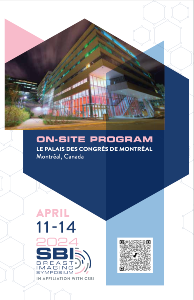Training Tomorrow’s Mentors: Results from the Society of Breast Imaging’s Mentorship Training Pilot Program
ePosters
- LM
Lisa A. Mullen, MD
Assistant professor
Johns Hopkins University School of Medicine
Johns Hopkins University School of Medicine
Presenter(s)
Purpose: Effective mentorship facilitates career development. This study assessed the effectiveness of the Society of Breast Imaging (SBI) pilot mentor training program using pre- and post-training session surveys.
Materials and Methods: A mentor training program was developed and delivered by SBI mentorship committee members as a one-hour online presentation. A 27-question survey with a 1-5 Likert scale was distributed electronically to mentors before and after participation in the online training program. Questions covered demographics, prior mentorship experience, and perceived mentorship knowledge. Additional questions in the post-training survey evaluated the training program. Responses were analyzed using paired and unpaired t-tests.
Results: Twelve of 14 (92.9%) invited mentors completed surveys and mentorship training. Pre- and post-training survey response rates were 71.4% (10/14) and 75.0% (9/12), respectively. Of the survey respondents, 66.7% (8/12) were female, 50% (6/12) academic, and 83.3% (10/12) had been mentors before with 25% (3/12) having prior formal mentorship training. Self-assessment of all mentorship knowledge topics improved from a score (on a scale of 1 to 5) of 3.80 (pre) to 4.24 (post, p=0.017). Individually, 6 topics showed significant improvement: mentorship phases (3.70 vs 4.33, p=0.031), early mentoring issues (3.70 vs 4.22, p=0.033), goal setting (3.70 vs 4.33, p=0.006), SMART goals (3.00 vs 4.22, p=0.004), roadblocks (3.40 vs 4.11, p=0.015), and closure (3.10 vs 4.11, p=0.005). On the post-training survey, participants agreed that they learned new information (4.44), were better prepared to mentor (4.33), and the training was worth their time (4.33).
Conclusion: Formal mentorship training through the SBI mentorship pilot program improved mentors’ self-perceived knowledge and preparedness. These results demonstrate the program’s effectiveness and will guide future mentor training.
Clinical Relevance Statement: A structured mentorship training session delivered virtually can provide mentors with skills and knowledge to guide mentees. Mentors reported gaining valuable perspectives on the phases of a mentor-mentee relationship, characteristics of a healthy mentor-mentee relationship, commonly encountered challenges, and strategies to overcome mentorship obstacles.
Materials and Methods: A mentor training program was developed and delivered by SBI mentorship committee members as a one-hour online presentation. A 27-question survey with a 1-5 Likert scale was distributed electronically to mentors before and after participation in the online training program. Questions covered demographics, prior mentorship experience, and perceived mentorship knowledge. Additional questions in the post-training survey evaluated the training program. Responses were analyzed using paired and unpaired t-tests.
Results: Twelve of 14 (92.9%) invited mentors completed surveys and mentorship training. Pre- and post-training survey response rates were 71.4% (10/14) and 75.0% (9/12), respectively. Of the survey respondents, 66.7% (8/12) were female, 50% (6/12) academic, and 83.3% (10/12) had been mentors before with 25% (3/12) having prior formal mentorship training. Self-assessment of all mentorship knowledge topics improved from a score (on a scale of 1 to 5) of 3.80 (pre) to 4.24 (post, p=0.017). Individually, 6 topics showed significant improvement: mentorship phases (3.70 vs 4.33, p=0.031), early mentoring issues (3.70 vs 4.22, p=0.033), goal setting (3.70 vs 4.33, p=0.006), SMART goals (3.00 vs 4.22, p=0.004), roadblocks (3.40 vs 4.11, p=0.015), and closure (3.10 vs 4.11, p=0.005). On the post-training survey, participants agreed that they learned new information (4.44), were better prepared to mentor (4.33), and the training was worth their time (4.33).
Conclusion: Formal mentorship training through the SBI mentorship pilot program improved mentors’ self-perceived knowledge and preparedness. These results demonstrate the program’s effectiveness and will guide future mentor training.
Clinical Relevance Statement: A structured mentorship training session delivered virtually can provide mentors with skills and knowledge to guide mentees. Mentors reported gaining valuable perspectives on the phases of a mentor-mentee relationship, characteristics of a healthy mentor-mentee relationship, commonly encountered challenges, and strategies to overcome mentorship obstacles.

